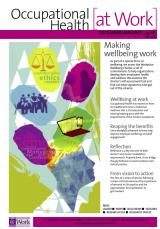December/January 2015/2016 (vol. 12/4)
ContentsFeaturesNewsLegal
NewsResearch DigestResearch PlusCPD
Research Plus
Intensive physical activity improves work ability
Intensive leisure-time physical activity is associated with higher work ability (WA) among workers doing physically demanding work, analysis of the Danish Work Environment Cohort Study reveals. WA is a measure of a worker’s physical and mental capacity in relation to the demands of their job, with poor WA associated with long-term sickness absence, exit from the labour market and incapacity. The study investigated 2,952 workers who did a physically demanding job. WA was self-assessed on a scale from 0 (poor) to 100 (excellent). Leisure activity was classified as: (a) walking, cycling or other low-intensity exercise (no sweating or shortness of breath); (b) exercise training, heavy gardening or higher-intensity walking/cycling (sweating plus shortness of breath); and (c) strenuous exercise training or competitive sports. After adjusting for gender, age, lifestyle, work-related factors and chronic disease, those doing at least five hours a week of high-intensity physical activity (categories b or c) scored eight points higher on the WA scale, with a significant dose–response effect (p < 0.0001). Low-intensity leisure activity was not associated with WA.
Scandinavian Journal of Public Health 2015; 43(8): 819–824. doi: 10.1177/1403494815600312.
Occupational Health at Work December/January 2015/2016 (vol. 12/4) pp36



